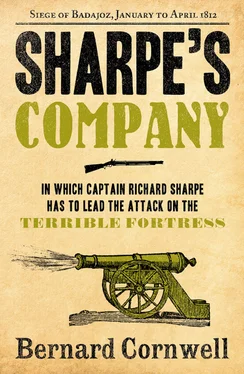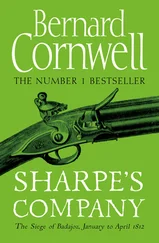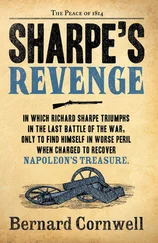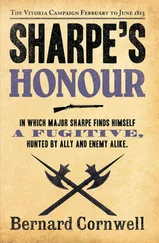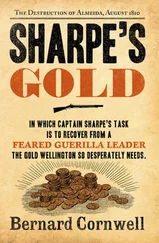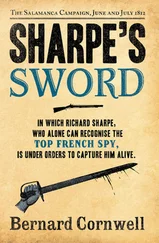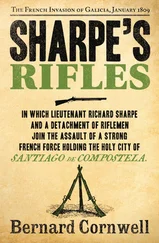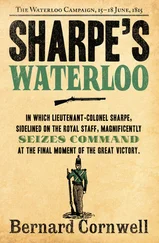Sharpe was afraid.
It was a strange knowledge, known to him alone, and he was ashamed of it. It was not certain that the attack would be on this day, but the army, with the instinct of men who know that the time has come, were confident that Wellington would order the assault this night. No one knew which battalions would be chosen, but whichever units were to brave the assault they would not be the first attackers to climb the breach. That was a job only for volunteers, the ‘Forlorn Hope’, whose suicidal task was to draw the defenders’ fire, force them to spring their carefully prepared traps, and clear a bloody path for the battalions that followed. Not many of the Forlorn Hope would live. The Lieutenant who commanded, if he was still alive, would receive his Captaincy on the spot and his two Sergeants would be made Ensigns. The promises of promotion were easily given because they rarely had to be kept, yet there was never a shortage of volunteers.
The Forlorn Hope was for the brave. It may have been a courage born of desperation, or foolhardiness, but it was courage just the same. Men who survived a Hope were marked for life, famous among their comrades, envied by lesser men. Only the Rifle Regiments gave a badge to the survivors, a laurel-wreath that was sewn to the sleeve, but Sharpe did not hanker after medals. He simply wanted to survive a test, the supreme test of almost certain death because he had never been in a Forlorn Hope. It was a foolish desire, and he knew it, but it was there.
It was not just a test. Richard Sharpe wanted the promotion. He had joined the army at sixteen, as a Private, and worked his way through the ranks until he was a Sergeant. On the battlefield of Assaye he had saved the life of Sir Arthur Wellesley and had been rewarded with the telescope and a commission. Ensign Sharpe risen from the gutter, but still ambitious, still needed to prove, day after day, that he was a better soldier than the privileged sons who purchased their promotions and climbed the officers’ ladder with monied ease: Ensign Sharpe became Lieutenant Sharpe and, wearing a new uniform, the dark green of the 95th Rifles, he fought his way through Northern Spain and Portugal; the Corunna retreat, Rolica, Vimiero, the Douro crossing, and Talavera. He had taken the French Eagle at Talavera when he and Sergeant Harper had hacked their way into an enemy battalion, cut down the standard bearer, and brought the trophy back to Wellesley. He became the Viscount Wellington of Talavera. And Sharpe had been gazetted, just before the battle, as a Captain. It was the promotion he most wanted; the chance to lead his own Company, but the gazette was now two and a half years old and it was still unapproved.
He could hardly believe it. In July he had gone back to England and spent the last six months of 1811 recruiting in London and the Shires for the shrinking South Essex Regiment. He had been feted in London, dined by the Patriotic Fund, and presented with a fifty-guinea sword for the capture of the French Eagle. The Morning Chronicle had dubbed him ‘the scarred Hero of the Field of Talavera’ and suddenly, for a few days at least, everyone had wanted to meet the tall, dark-haired Rifleman with the scar that gave his face an unnatural, mocking expression. He had felt out of place in the draped softness of London’s drawing rooms and had covered his discomfort by shrinking into silent watchfulness. The reticence had been thought dangerously attractive by his hostesses who had kept their daughters upstairs and the Rifle Captain to themselves.
But the Hero of the Field of Talavera was nothing but a nuisance to the Army Headquarters in the Horse Guards. It had been a mistake, a stupid mistake, but he had visited Whitehall and been shown to a bare waiting room. The autumn rain had spattered through a high, broken window as he sat, his huge sword across his knees, while a clerk with smallpox scars tried to find what had happened to the gazette. Sharpe simply wanted to know whether he was a real Captain, sanctioned as such by the Horse Guards’ approval, or merely a Lieutenant in borrowed and temporary rank. The clerk had kept him waiting three hours, but at last returned to the room. ‘Sharpe? With an “e”?’
Sharpe nodded. Around him a group of half-pay officers, sick, lame or half-blind, listened curiously. They were all seeking appointments and hoping Sharpe would be disappointed. The clerk blew dust off the papers in his hand.
‘It’s irregular.’ He peered at Sharpe’s dark green jacket. ‘You said the South Essex Regiment?’
‘Yes.’
‘But that, if I’m not mistaken, and I rarely am, is the uniform of the 95th?’ The clerk gave a small, self-satisfied laugh, as if in celebration of a small victory. Sharpe said nothing. He wore the uniform of the Rifles because he was proud of his old Regiment, because the job with the South Essex was only ever intended as a temporary attachment, and how was he to tell this pinched bureaucrat about leading his small band of Riflemen from the horrors of the Corunna retreat down to join the army in Portugal where they had been arbitrarily joined to the redcoats of the South Essex. The clerk twitched his nose and sniffed. ‘Irregular, Mr Sharpe, very irregular.’ He selected the top piece of paper with ink-stained fingers. ‘This is the document.’
He held Sharpe’s gazette as if the document might reinfect him with smallpox. ‘You were given a Captaincy in 1809?’
‘By Lord Wellington.’
The name cut no ice in Whitehall. ‘Who should have known better. Dear me, Mr Sharpe, he should have known better! It’s irregular.’
‘But not unknown, surely?’ Sharpe had suppressed his urge to vent his irritation on the clerk. ‘I thought it was your job to approve these documents.’
‘Or disapprove them!’ The clerk laughed again and the half-pay officers grinned. ‘Disapprove, Mr Sharpe, or disapprove!’ Rain fell down the chimney and hissed on the meagre coal fire. The clerk, his thin shoulders heaving with silent laughter, tugged a pair of spectacles from the recesses of his clothing and clipped them on to his nose as if the gazette, seen through smeared glass, might reveal new cause for merriment. ‘We disapprove them, sir, most of the time. You allow one and you allow all. It upsets the system, you know. There are rules, regulations, standing orders!’ And the clerk shook his head because it was obvious Sharpe understood nothing of the army.
Sharpe waited for the head-shaking to cease. ‘It seems to have taken you a long time to make any decision on this gazette.’
‘And still not made!’ The clerk said it proudly, making it seem that the length of time proved the gravity of the Horse Guards’ wisdom. Then he seemed to relent and offered Sharpe a rueful smile. ‘The truth is, Mr Sharpe, that there was a mistake. A regrettable mistake and your visit has happily rectified the mistake.’ He peered over his glasses at the tall Rifleman. ‘We are really most grateful to you for drawing it to our attention.’
‘Mistake?’
‘It was filed wrongly.’ The clerk plucked another piece of paper from his left hand. ‘Under Lieutenant Robert Sharp, no “e”, who died of the fever in 1810. His papers were, otherwise, in perfect order.’
‘Which mine are not?’
‘Indeed, no, but you are still alive.’ The clerk looked peevishly at Sharpe. ‘We do a have a chance of tidying up when an officer is translated to glory.’ He took off his glasses and cleaned them with Sharpe’s folded gazette. ‘It will be attended to, Mr Sharpe, with expedition. I promise you. With expedition!’
‘Soon?’
‘That’s what I said, isn’t it? It would be wrong to say more.’ The clerk pushed his spectacles back into place. ‘Now, if you’ll pardon me, there is a war on and I have other duties!’
Читать дальше
